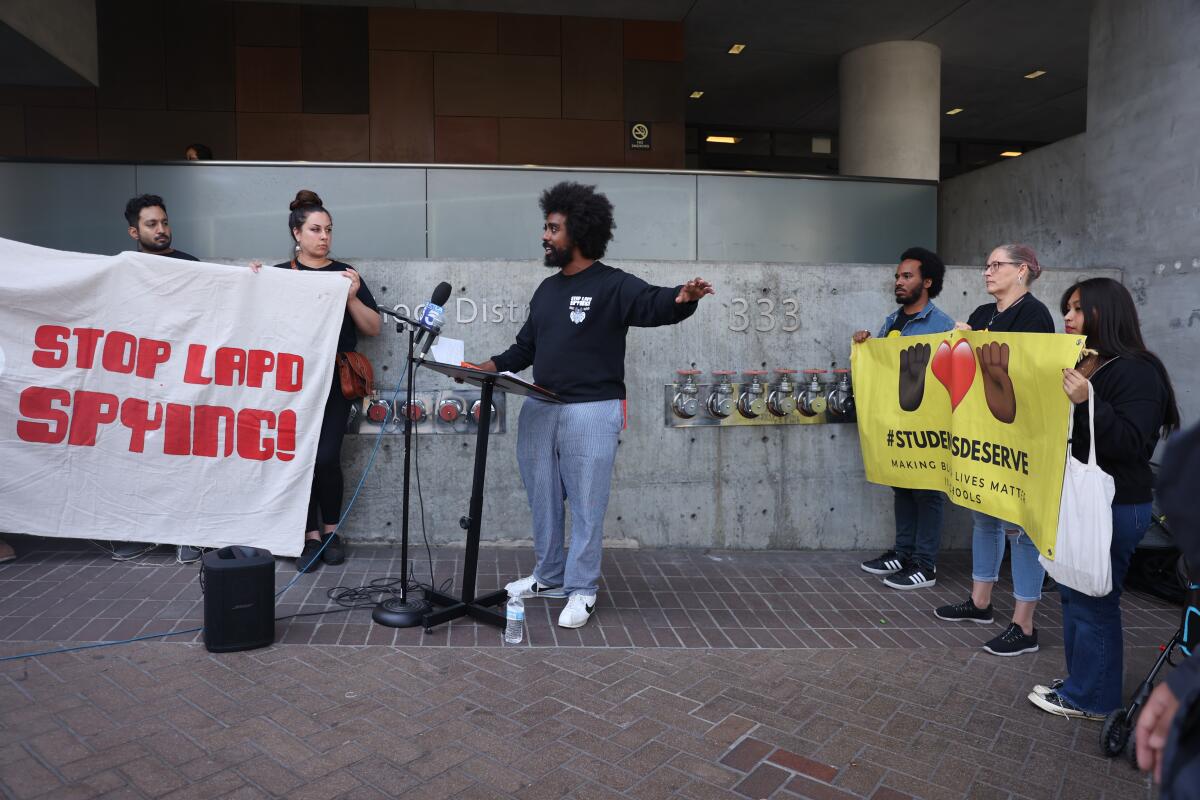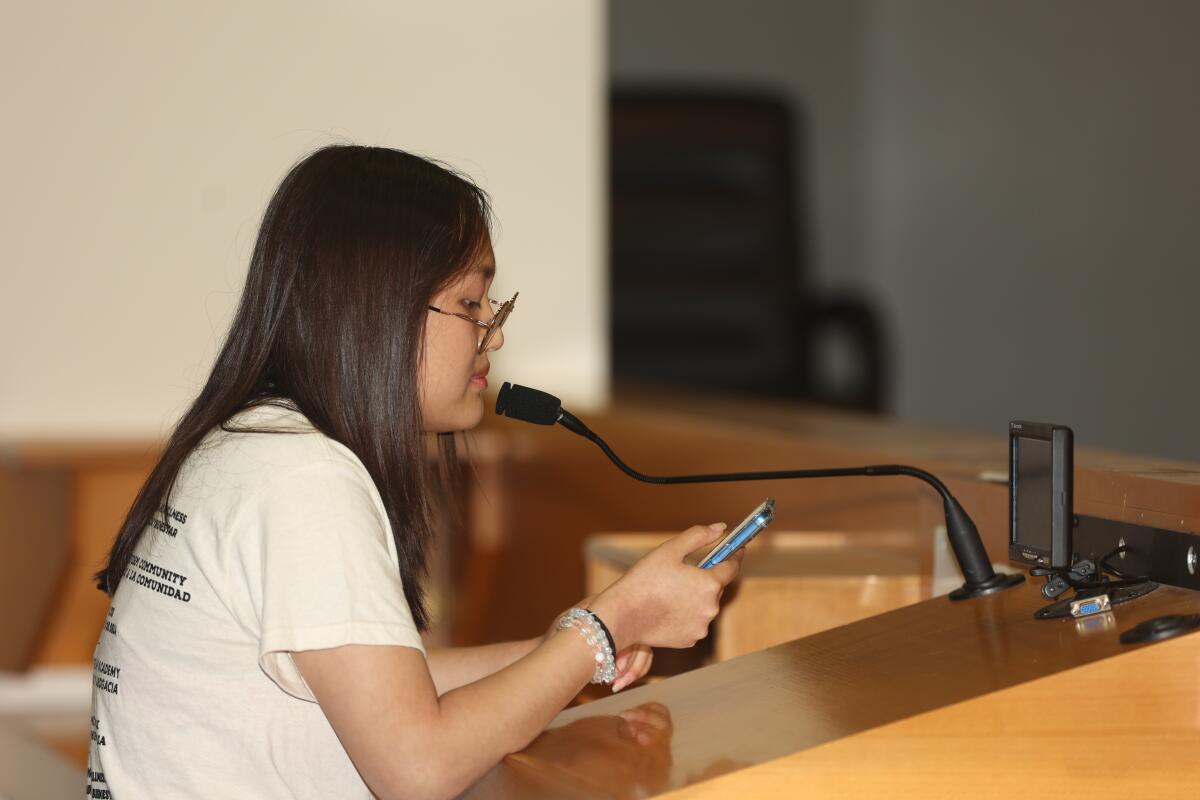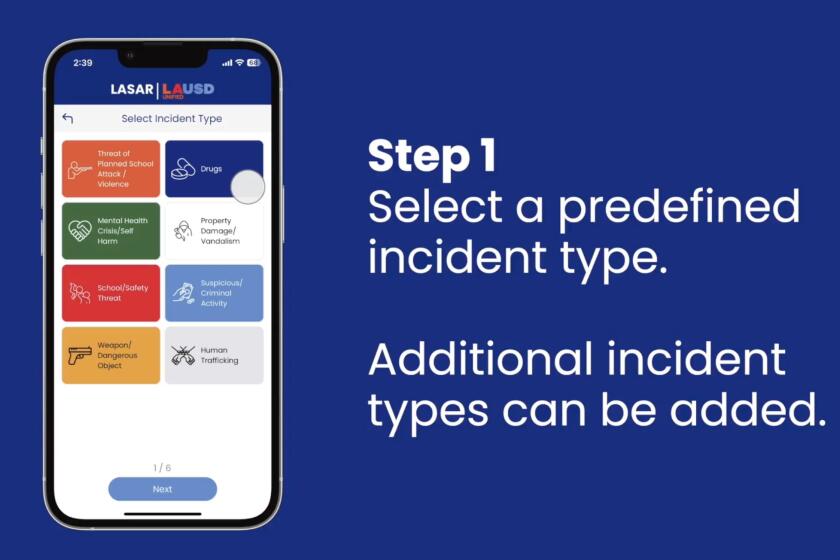Activist groups sue L.A. schools seeking data on app used to report suspicious behavior

- Share via
More than a year after the Los Angeles Unified School District rolled out an anonymous reporting app in an effort to make its campuses safer, advocacy groups are suing the district for creating “a culture of mass suspicion.”
The Los Angeles Schools Anonymous Reporting app, also known as LASAR, was unveiled in March 2023 and allows anyone to anonymously report nonemergencies and suspicious activity to the Los Angeles School Police Department. L.A. schools Supt. Alberto Carvalho has called the app “critically important” for public safety.
But members of the Stop LAPD Spying Coalition and Students Deserve, a youth-led organization promoting investment in Black students, allege the app is leading to the disproportionate targeting of minorities and disabled people as well as an increased police presence on campus.
Information released by the school district — the nation’s second-largest with more than 500,000 students — showed 227 reports were made on LASAR during its first three months in action last year. It’s unclear how many of those reports resulted in an officer being dispatched to a campus.
The organizers behind the lawsuit said they filed a public records request with L.A. Unified in September to get more information, including the number of reports filed and the content and type of each report. They’re now suing for a response to that request, said Stop LAPD Spying Coalition organizer Matyos Kidane.

“We’re trying to get records from this lawsuit to better understand what the harms will be,” Kidane said. “But our long-term goal is to discontinue this app.”
One new app in L.A. Unified is for parents and students to report non-emergency issues. The second app is for employees, like an internal 9-1-1 system.
LAUSD declined to comment, citing pending litigation.
The app includes report categories such as vandalism and mental health crises, and is open to the public — not just LAUSD students or employees.
The app “aims to increase community focused public safety in and around” schools, an LAUSD report said. Every LASAR report is sent to the Los Angeles School Police Department, where an officer will triage the incident and “determine the necessary resource to dispatch,” the report said.
LASAR allows a user to submit photos or videos and tracks where incidents were reported.
Kidane raised concerns about how the app developer, Kokomo 24/7, collects and uses student data. The company did not respond to a request for comment.
Apple’s App Store tells LASAR users that their “data is not collected.”
The developer created LASAR, along with another public safety app that allows LAUSD staff to contact 911, with funding from a $123,000 federal grant.
Kidane compared the app to an LAPD program called iWatch that encouraged community surveillance through anonymous reporting. Audits found that iWatch reports disproportionately affected people of color.
“This app embodies behavioral surveillance,” Kidane said at a news conference Tuesday. “Behavioral surveillance is always a proxy for racial profiling.”
Joseph Williams, director of Students Deserve, said the school district needs a community-based approach to public safety, not behavioral surveillance and more police officers.
The Board of Education meeting where LASAR was first showcased in 2023 drew demonstrators calling for the elimination of the Los Angeles School Police Department. Many of those against the app have said they would like to see fewer police officers on campuses in general.
Behavioral surveillance targets racial and ethnic minorities as well as neurodivergent students, said Vanessa Ramos, an advisor with Disability Rights California and an LAUSD parent. She’s worried that harmless behaviors will be seen as threats and reported to the police, she said Tuesday.
“Characteristics of a disability can be mischaracterized and misinterpreted,” Ramos said. “Someone could sound the alarm using this app and then you have the police involved.”
Seventeen community organizations have signed a Stop LAPD Spying open letter condemning LASAR. They include Disability Rights California and the ACLU of Southern California.
LAUSD officials need to find public safety solutions that don’t involve surveillance and armed officers, one teacher said at the news conference.
“We have police on every corner,” said Dr. Maya Angelou Community High School teacher Rigoberto Gandara. “If policing was the solution to public safety, we would already be safe.”
More to Read
Sign up for Essential California
The most important California stories and recommendations in your inbox every morning.
You may occasionally receive promotional content from the Los Angeles Times.











